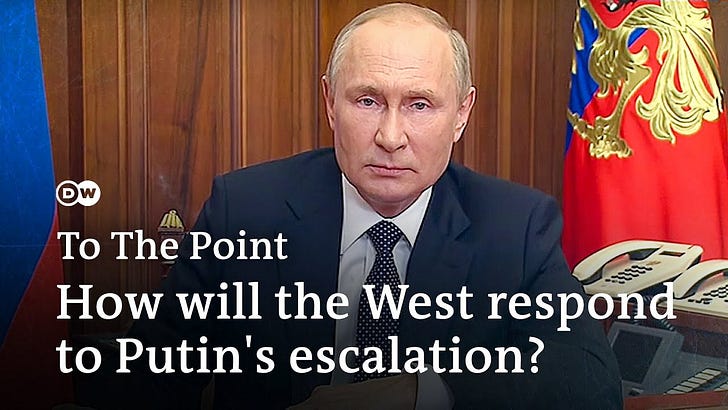New Russian mobilization for the war with Ukraine
Russia has announced a wider mobilization of troops to fight in Ukraine. The war won't be ending this year, it appears, and the refugee flow to EU countries is likely to get worse. Putin's government is also hoping to use energy shortages to weaken EU unity on sanctions. And the refugee issue is one that Russia and far-right parties in the EU aligned with it have been active exploiting with varying intensity since 2015. (Karl Ritter, Putin orders partial military call-up, sparking protests AP News 09/22/2022; Connor Echols, Putin mobilizes 300,000 reservists in significant escalation Responsible Statecraft 09/21/2022)
It's officially a "partial" mobilization. But it initially seems to be pretty dramatic in practice: Andrew Roth, ‘It’s a 100% mobilisation’: day one of Russia’s drive to build its army Guardian 09/22/2022.
Anatol Lieven is still hoping for some kind of near-term diplomatic solution, but not necessarily expecting one:
Putin's latest moves do not yet eliminate the possibility of a diplomatic end to the war; but we are getting awfully close:https://t.co/UiXPAWReRs
— Anatol Lieven (@lieven_anatol) September 22, 2022
He discusses this in Tick-tock: Putin escalation begins countdown of diplomacy clock Responsible Statecraft 09/22/2022:
It also suggests that the Russian government recognizes the extent of its strategic failure. This, and the fact that in his speech Putin made a positive reference to the peace proposals issued by the Ukrainian government last March, suggest that Russia may now be ready for negotiations, as long as they achieve at least some of the Kremlin’s initial goals. But how long will this moment be in our grasp?
The mobilization, of course, is a significant act of escalation in itself (though also a predictable response to recent Ukrainian battlefield successes). What makes it truly dangerous, however, is that this was announced in tandem with Putin’s endorsement of planned votes in Donbas and other Russian-occupied areas in Ukraine over whether those regions will join the Russian federation.
If these areas are annexed by Russia, this will make any peace settlement in Ukraine much more difficult for a long time to come.
He's sketching a not-quite-worst-case situation there that doesn't involve actual use of nuclear weapons. But He insists on look on the positive side. "The window of opportunity for a peaceful settlement in Ukraine is therefore narrowing fast. It does however still exist."
Deutsche Welle has this panel discussion on what the mobilization means for the hopes for a short-term de-esclation, War in Ukraine: Is there still time to de-escalate? | To The Point 09/22/2022:
(One of the panelists warns about being "too gentile with Russian feelings." It's clear that it was a mispronunciation of "gentle," which is what the closed-caption text uses.)
Here's a German-language panel with the same panel, Krieg in der Ukraine: Ist die Eskalation noch zu stoppen? | Auf den Punkt 09/22/2022.
Russia's senior partner China is calling for a ceasefire. Or, maybe not: Stuart Lau, Cease-fire misfire Politico EU 09/22/2022.
A cautionary note about Western over-reaction - the New Cold Warriors are currently all about over-reaction - comes from Brown University's Costs of War project: Lyle J. Goldstein, Threat Inflation, Russian Military Weakness, and the Resulting Nuclear Paradox: Implications of the War in Ukraine for U.S. Military Spending 09/15/2022:
[I]t is important that the U.S. not succumb to threat inflation, or “speech that gives an exaggerated sense of danger,” in regards to public and official perceptions of Russia. Historically, threat inflation has led to disastrous and unnecessarily costly U.S. foreign policy decisions. Russia is a weaker conventional military power than many in the U.S. had imagined; thus, there is no additional cause for intensified fear of a Russian military threat to the U.S. nor for the resultant expansion of the Pentagon budget. On the other hand, if the U.S. and NATO increase their military spending and conventional forces in Europe, the weakness of Russian conventional military forces could prompt Moscow to rely more heavily on its nuclear forces. [my emphasis]
It could very well be that the Putin government is playing into the goal that US Defense Secretary Lloyd Austin has stated for the war: "We want to see Russia weakened to the point where it can’t do things like invade Ukraine."
The new mobilization and the prolongation of the Russia-Ukraine war also is a strategic boost for China in terms of making any near-term process of Russia working with the US and the EU in a power-balancing arrangement against China. The likelihood that Russia will be very dependent on China for a protracted period is higher than ever.
As the current war illustrates, peace in Europe depends on some kind of stable security arrangement of the EU with Russia. If a Trump or DeSantis Presidency pulls back on the US commitment to Europe, or even pulls the US out of NATO altogether. But for the moment, we looking at significant prolongation of the current close alignment of Russia and China and a mutual policy of hostility and threat between Europe and Russia.


